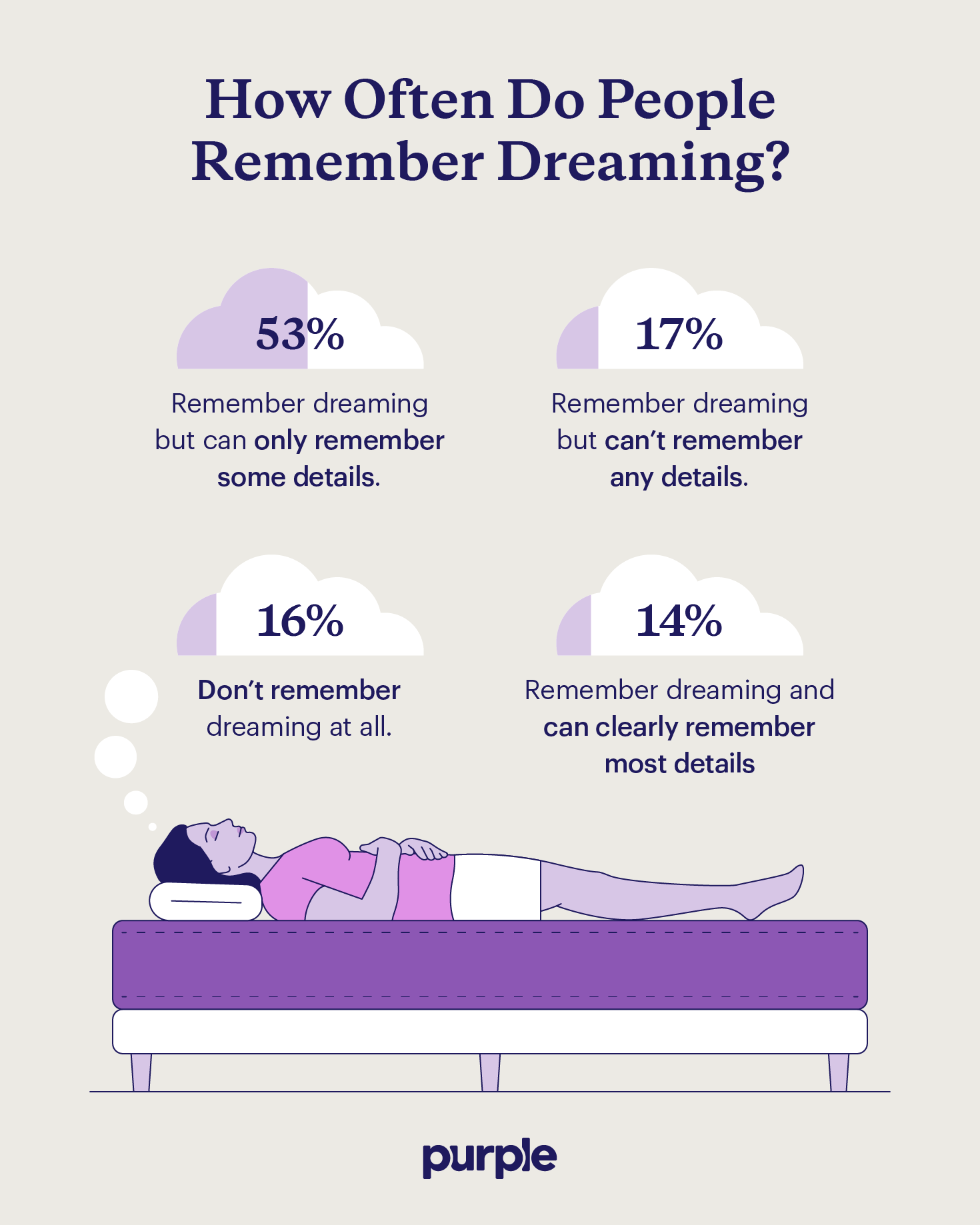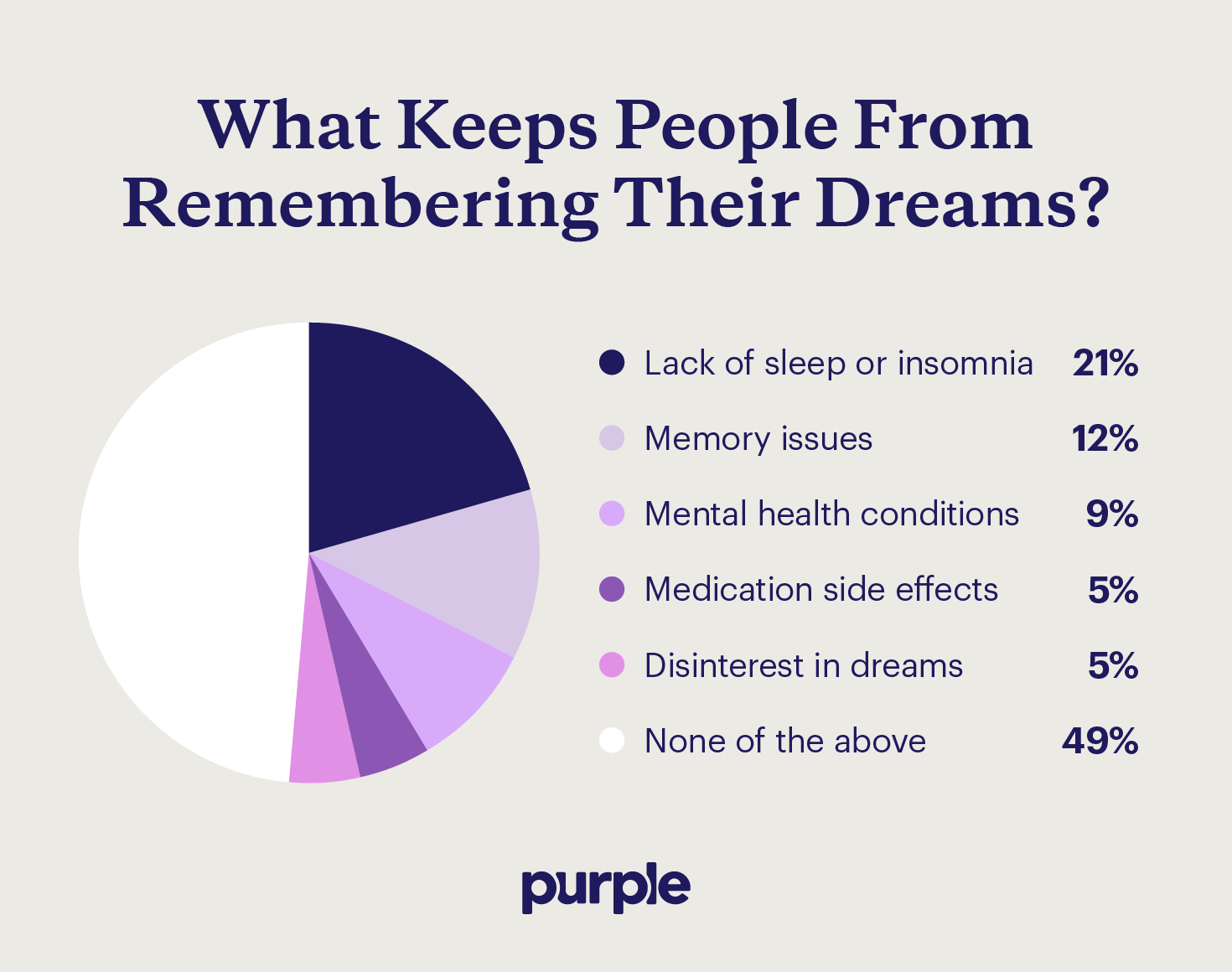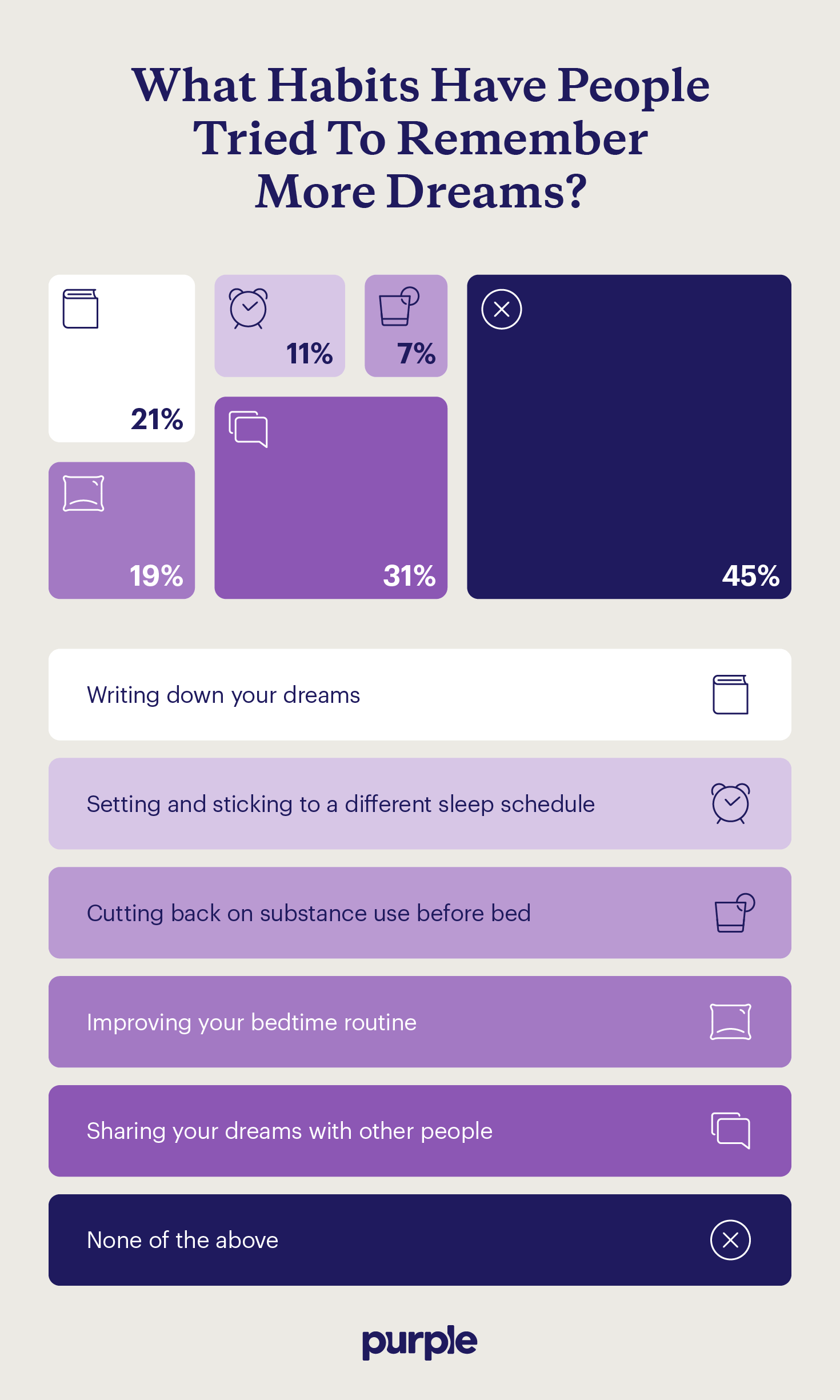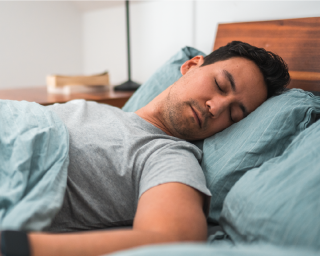
84% of Americans Remember Dreaming Each Night —Why Don't You? [Survey]
What does it mean if you never dream?
- If you never remember your dreams, it’s likely because you’re not getting enough REM sleep. Other causes may include stress, sleep disorders, or a lack of interest in dreams.
- Not remembering your dreams is relatively uncommon — nearly 84% of Americans remember dreaming most nights.
- While everyone dreams, many people want to remember their dreams more often; over 50% of Americans have changed their habits to try to remember more of their dreams, but only one-third believe these changes helped.
Dreams primarily occur during REM sleep, and while the exact reason why we dream is a topic of debate, the truth is that everyone dreams — some people just don’t remember. You’re not alone if you have ever wondered: “Why don’t I dream?”
We asked over 1,000 Americans over the age of 18 and concluded that it is far more common to remember that you dreamt, even if you don’t remember the details. Including one-off dreams and recurring dreams, we learned from our latest survey that more than 70% of Americans remember their dreams at least once or twice a month.
While that places those who rarely remember dreaming in the minority, plenty of people find themselves in that camp with an even larger number of sleepers claiming they can’t recall what happens in their dreams.
Keep reading to learn more about how common it is to remember your dreams and what you can do to enhance your memory of dreams.
Key Takeaways
If you’ve ever worried about why you don’t have dreams, it’s not just you. Our survey revealed that 20% of people don’t believe they dream every night. We also learned that:
- Only 16% don’t remember dreaming when they wake up.
- Nearly 45% haven’t tried to remember more of their dreams.
- And 30% are content with the dreams they can remember.
Over 52% of Americans Can Only Remember a Few Details From Their Dreams
While remembering some dream details seems to be the most common experience, 14% remember dreaming with vivid detail while 17% remember the sensation of dreaming without any specifics. This suggests that it is far more common to remember dreaming when you wake up as opposed to have no recollection.
We also found that nearly 77% of Americans believe that they dream every night. Seeing as everyone dreams whenever they get deep sleep, most people dream every night, whether they can remember the details or not.
More Than Half Remember What They See and Who Shows Up in Their Dreams
Some studies suggest that people think in different ways; some people are visual thinkers while others think in words or sounds.1 According to our study, the most common dream elements people are likely to remember from their dreams include:
- Visual details (27%)
- People (25%)
- Events (25%)
Comparatively, very few people remember sounds like dialogue or music (1.5%) or written words (1.1%) from their dreams, and 4% of people don’t remember any part of their dreams. These findings suggest that the way you think may impact what you dream about or at least what you’re more likely to remember.
Over 56% Want To Remember Their Dreams More Often
Even for those who can remember their dreams, a majority of Americans would like to remember more of them. Nearly 21% wish they could remember every dream, and 36% would rather remember more dreams — not every single one.
Satisfaction with the number of dreams remembered seems to vary based on the amount of sleep. 57% of those who get under eight hours of sleep would like to remember more of their dreams, while 32% of people who get more than 8 hours of sleep are content with the dreams they can remember.
Not everyone wants to improve their dream recall, though they are in the minority; only 6% would prefer to remember fewer dreams, and nearly 7% would rather not remember any dreams at all.
Not remembering dreams can be a cause of concern or uncertainty for some sleepers, and those who are entertained by their dreams or dream analysis may be disappointed when they can’t remember what they dream about. Fortunately, there are a number of ways to increase your likelihood of dream recall, though your success may vary.
Nearly 45% Haven’t Tried Common Methods To Remember More Dreams
While many Americans want to remember more of their dreams, many have not attempted to change their habits to increase their chances of recalling dreams.
Some of the most common habits recommended to help you remember your dreams include:
- Writing down your dreams
- Reflecting on them when you first wake up
- Telling other people about your dreams
- Setting and sticking to a more consistent sleep schedule
- Improving your bedtime routine
- Cutting back on substance use before bed
Learn more about the best habits for remembering your dreams.
Of these, nearly 31% have tried discussing their dreams with other people, and around 21% have written down details of their dreams. Under 19% have attempted to improve their bedtime routine.
These methods aren’t foolproof ways to improve dream recall, but making positive changes to your lifestyle and sleep hygiene may help improve the quality of your sleep, and therefore your dreaming and dream recall ability.
Our methodology: We surveyed 1,002 U.S. adults 18+ via SurveyMonkey on December 6, 2024. Data is unweighted and the margin of error is approximately +/-3% for the overall sample with a 95% confidence level.
8 Reasons You May Forget Your Dreams
During the REM stage of sleep, everyone dreams, even when they don’t remember it. Forgetting what you dream about is fairly common, but several factors could be contributing if you’ve noticed that you remember fewer details or can’t remember dreaming at all.
1. Insufficient Sleep
More than one in five Americans cite insomnia or a lack of sleep as something that prevents them from remembering their dreams. That number increases to 39% for people who sleep less than 6 hours per night.
But, more than two-thirds of people who sleep more than 8 hours each night don’t believe any of these factors limit their ability to remember their dreams.
Not remembering dreams may be more common for those who don’t get enough sleep; if you don’t sleep long enough to get core sleep (stage 3 and REM) to complete your sleep cycle, you may not sleep deeply enough to dream.
The quality of your sleep may also affect your dream recall; one study suggests that higher-quality sleep may improve your ability to remember your dreams.2
Forgetting your dreams may not necessarily be a sign of poor sleep quality, but if you want to get more deep sleep, you may end up remembering more of your dreams in the process.
2. Stress
If you’re too stressed to fall or stay asleep, you may spend less time in REM sleep, reducing how much you actually dream. Stress can also affect how you store and process information, including dreams, so you may be less likely to remember dreaming if you’re going through a period of elevated stress.
For some people, stress may simply impact the content of their dreams — stress dreams can result in stress or anxiety upon waking with themes like loose teeth, falling, and embarrassing situations.
3. Disinterest
There’s nothing wrong with being uninterested in what your dreams involve, but if they aren’t a priority, you may be less likely to remember them.
Some studies suggest that higher levels of creativity correlate with more vivid, memorable dreams. If you want to remember more of your dreams, engaging in creative exercises or activities may increase your chances.
4. Sleep Disorders
Insomnia, sleep apnea, restless legs syndrome, sleepwalking, and other sleep disorders commonly affect the duration and quality of your sleep. If you have trouble falling asleep or you wake up throughout the night, you’re less likely to get the deep sleep necessary for dreaming.
There are several things you can do when you can’t sleep, but if you experience frequent sleep problems or disruptions, it may be best to speak with your doctor.
5. Mental Health Conditions
Sleeping with anxiety, depression, or other mental health conditions can be more challenging than you might expect; individuals with mental health disorders may find it hard to fall asleep due to racing thoughts or general insomnia, impacting their ability to dream if the REM cycle is disrupted.3
6. Medication Side Effects
Different medications can impact your ability to fall and stay asleep, limiting your time spent in REM sleep. Treatments for depression and anxiety — namely selective serotonin reuptake inhibitors (SSRIs) — may cause insomnia or disrupted REM cycles, which may make you less likely to remember your dreams.4
7. Substance Use
While 44% of people who tried cutting back on alcohol, recreational drugs, and sleep medications reported no improvements in their ability to recall their dreams, reducing your substance use before bed may make it easier to fall and stay asleep.
Paired with other good sleep hygiene practices like sticking to a consistent sleep schedule, this habit change may help improve your sleep quality and make it easier for you to remember what you dream about.
8. Aging
As you get older, your sleep habits will likely begin to change. Most people begin to dream less often because they spend less time in REM sleep as they age.5 Cognitive deterioration may also contribute to a lower likelihood that you’ll remember your dreams.
From our survey, almost 12% cited memory issues as something that keeps them from remembering dreams. While anyone can experience memory issues, they are often more common among older individuals, making them more likely to forget more of their dreams.
How To Remember Dreams: 7 Tips
Whether you don’t know how to remember your dreams or you want to recall more vivid details, there are several practices you can try to increase your chances of remembering what happens in your dreams.
- Reflect on them: If you remember dreaming when you wake up, reflect on your dreams before you get out of bed. This habit can help you remember more details, especially if you do it regularly.
- Write them down: When you remember any part of your dreams, jot down the details in a journal or notes app. Making a habit of documenting what you remember can train your brain to focus on more.
- Tell other people: Sharing what you remember of your dreams with friends or family can help you remember more details; as you recount the details you remember, you may find yourself remembering more.
- Wake up earlier: You’re more likely to remember your dreams if you wake up during the REM cycle, so if you have a consistent time you go to bed, try waking up earlier than usual to see if you can remember more dreams.
- Adjust your sleep schedule: An inconsistent sleep schedule may mean you don’t get enough REM sleep. You can use a sleep calculator or just aim to get between six and eight hours of sleep each night to start.
- Improve your bedtime routine: Improving your sleep hygiene is never a bad practice. Try to limit screen time before bed and help yourself relax before lying down to improve your sleep quality.
- Cut down on substance use: Alcohol and other substances can interfere with the quality of your sleep, so limiting your intake may help you sleep better and dream more.
Documenting, reflecting on, and talking about your dreams seem to be the most effective ways to remember more dreams, but everyone will be different.
From our survey, nearly one-third of Americans have tried telling other people their dreams in the hopes that they’ll remember more of them. Of those people, 38% have been able to remember more of their dreams as a result — but another 34% are unsure if it’s helped.
Of the 21% of Americans who have tried writing down or reflecting on their dreams when they wake up, 47% have been able to remember more of their dreams as a result.
Is It Normal To Not Dream?
You’re not alone if you’ve ever wondered why you don’t dream, but everyone dreams when they experience REM sleep — some people may just not remember it because of sleep issues, discomfort, or a lack of interest.
While scientists may not know exactly why we need sleep, getting enough sleep — especially REM sleep — is generally related to your overall health. When you improve your sleep quality, you may feel more refreshed when you wake up, allowing you to function better during the day.
Investing in a high-quality mattress and pillows can help you fall asleep faster and stay asleep longer with minimal disruptions. Purple mattresses, bases, pillows, and bedding are all designed to deliver proven deeper sleep.
FAQ
Even if you don’t remember your dreams, everyone dreams when they get REM sleep. You may not dream if you don’t get enough REM sleep or your sleep is often interrupted, but this is fairly uncommon.
You may forget your dreams more often than you’re used to for several reasons, including:
- Elevated stress
- Sleep disorders
- Mental health conditions
- Aging
- Cognitive or memory issues
- Side effects of medication
- Substance use
If you remember your dreams vividly, that likely means you’ve woken up during REM sleep, as you have a greater chance of remembering dreams during the stage you spend dreaming.
Several factors can contribute to unpleasant dreams or nightmares, including:
- Unresolved stress
- Unmet psychological needs6
- Frustration or dissatisfaction while awake
But in many cases, not having good dreams may not reflect anything from your waking life. If you’re experiencing distress as a result of your dreams, you may consider talking to your doctor.
When dreaming, the parts of your brain responsible for logical thinking are less active, while the parts associated with emotions are more active, resulting in dreams that are often bizarre and don’t follow a logical narrative.7
Theories about why we dream may suggest that dreams are a means of processing information from waking life and exploring potential solutions to daily problems. Because of this, dreams may feel nonsensical and strange as your brain combines memories, emotions, and thoughts into something new.
More To Explore
Level up your sleep routine with our most-loved products.












